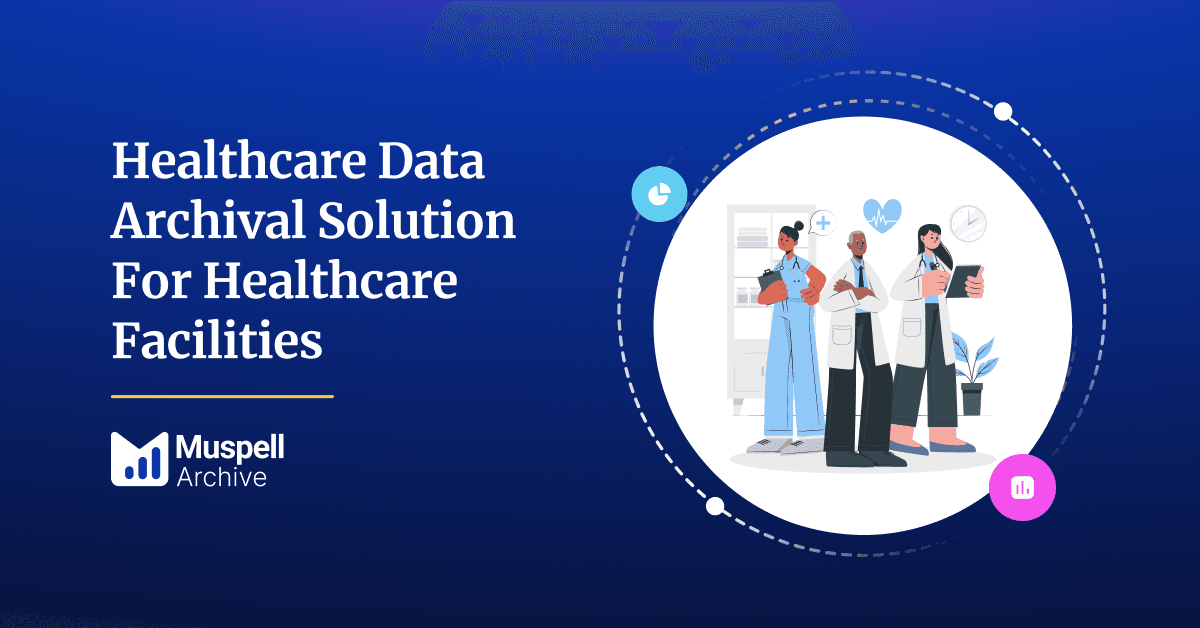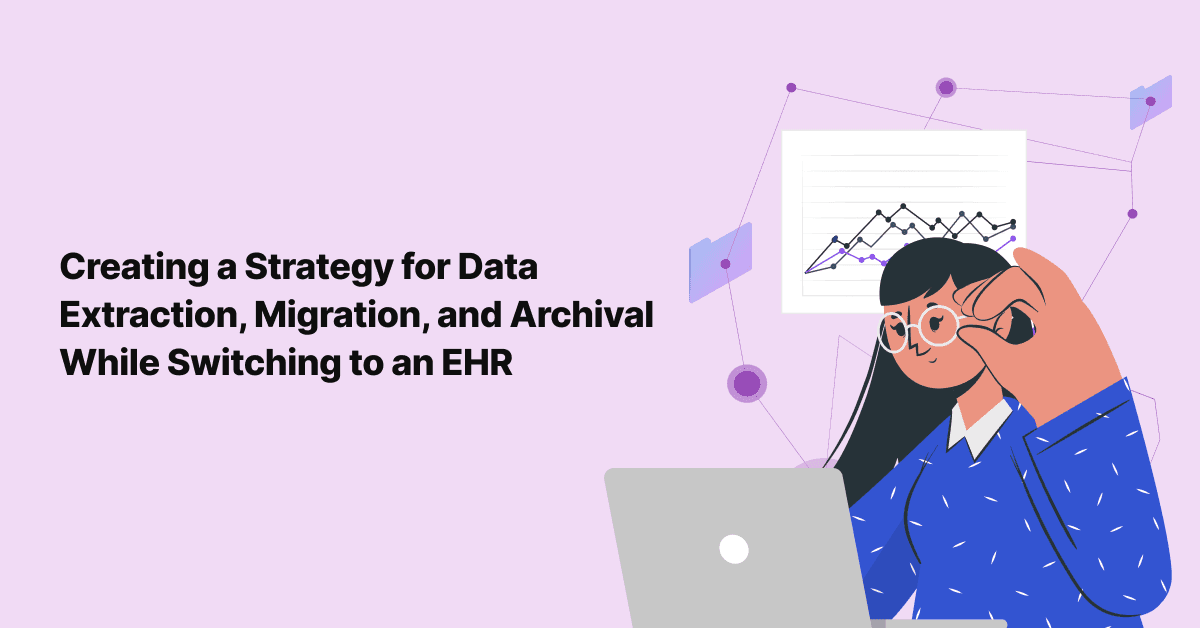
3 Ways to Improve Collaboration Between a Data Archival Vendor and Your Health System
The relationship that your health system shares with the archive vendors is as crucial a process as health …

Healthcare data archival and EHR data migration present healthcare organizations with substantial opportunities for cost reduction and data transformation. Implementing a robust archival system enables healthcare institutions to manage large volumes of data effectively. Additionally, as regulatory demands continually change, maintaining thorough records becomes essential for ensuring compliance and managing risks.
In this blog post, we review the correlation between healthcare data archival and EHR data migration.
Continuity of Care: Healthcare data archival ensures uninterrupted access to historical patient records during EHR migration. By integrating seamlessly with your new EHR application, these solutions give your clinicians a very effective package that enables them to access new data and old, with just a few clicks. Such functionality helps your care teams maintain continuity of care and make informed decisions based on comprehensive medical histories.
Compliance and Legal Requirements: Archiving healthcare data helps organizations meet regulatory obligations regarding data retention and patient privacy. HIPAA-compliant healthcare data archival solutions function like a vault that safeguards your organization against potential legal and compliance issues associated with data loss or unauthorized access.
Furthermore, their advanced functionalities, like Role-based Access Control (RBAC), help your administrator keep track of all user activity and Release of Information (ROI) requests, making it an essential resource to store your legacy EHR data.
Patient Safety: Access to archived data minimizes the risk of medical errors and adverse events by providing clinicians with complete information about past diagnoses. Healthcare data archiving solutions enable your teams to retrieve treatment, medications and prognosis information efficiency, thereby enhancing patient safety and quality of care.
Clinical Research and Analytics: Preserving historical healthcare data facilitates retrospective studies, trend analysis, and population health management initiatives. Normally, healthcare organizations pay extra costs to the legacy vendor to maintain old data on their platforms.
Not only does it expose your data to the long list of risks associated with aging EHR systems, but it also requires extra efforts to train your staff to continue to use them. Using healthcare data archival solutions during your migration process enables your care facility to effectively transform legacy EHR data into a standardized and interoperable format.
Transition Planning and Training: Healthcare data archival solutions support effective transition planning and training by providing access to legacy data for staff familiarization with the new EHR system. Due to this, the EHR migration process reduces productivity disruptions and downtimes.
Disaster Recovery and Business Continuity: Healthcare data archival serves as a vital component of disaster recovery and business continuity strategies, enabling healthcare organizations to recover critical information in the event of system failures, cyberattacks, or natural disasters.
Long-Term Data Preservation: Archiving healthcare data ensures the long-term preservation of valuable patient information beyond the lifecycle of individual EHR systems, safeguarding against data degradation, format obsolescence, and technological changes.
Related: Healthcare Data Archiving: An Essential for EHR migration
1:Reducing the Application Portfolio
One key strategy for achieving cost savings is reducing the application portfolio. Minimizing the operational burden associated with maintaining system availability, managing access, and ensuring backups and redundancy for data preservation is a great first step. By streamlining the application landscape, organizations can significantly cut down on operational costs.
The Expected Outcome: Merging disparate legacy systems into a single archive and decommissioning those systems enables your healthcare organization to unlock cost savings. Healthcare data archival solutions cost much less than legacy applications, many of which will be obsolete within a few years. A report by IDC, the premier research entity for technology markets, suggests healthcare facilities can expect to slash their legacy applications cost by 50%.
2: Finalizing What to Archive and What to Migrate
Efficient cost management involves making informed decisions about which data sets to archive and migrate. Strategic decision-making is crucial for a successful healthcare data archival project. A carefully planned process ensures your EHR application retains only relevant and valuable information, leading to highly optimized storage costs.
The Expected Outcome: Healthcare institutions are required by law to retain patient health records for specific durations. Employing a healthcare data archiving solution allows you to store older patient data while keeping current data accessible on their Electronic Health Record (EHR) systems. Modernized healthcare data archival solutions enable your care providers and clinical teams to dive into the legacy within their EHR applications effortlessly. This capability to archive and retrieve old patient health information aids healthcare organizations in achieving notable cost reductions.
3: Workflows for Better Patient Data Searchability
Enhancing patient data searchability is not just a convenience, but a cost-saving strategy. Efficient workflows that facilitate quick and accurate retrieval of patient data contribute to improved operational efficiency, reducing the time and resources spent on accessing crucial information.
The Expected Outcome: Contemporary healthcare data archival solutions offer a plethora of advanced functionalities in comparison to their traditional counterparts. Traditionally, data archival systems served as a straightforward method to back up data that isn't frequently accessed. However, the intricate nature of Protected Health Information (PHI) and the stringent HIPAA guidelines make employing such simplistic solutions challenging for healthcare organizations.
Modern healthcare data archival applications are designed to seamlessly integrate with Electronic Health Record (EHR) systems, facilitating your care providers to efficiently retrieve legacy data. This streamlined access to historical data is more cost-beneficial in the long term compared to the cumbersome process of running legacy EHR applications solely for data viewing purposes.
4: Effective Data Management
Security is paramount in healthcare, and effective access management to legacy data is a crucial aspect of cost savings. Ensuring full compliance with both HIPAA and SOC2 standards enables healthcare entities to mitigate the threats associated with penalties and data loss. Not only does secure data access management prevent expenses linked to legal consequences, but it also fosters trust among patients and stakeholders.
The Expected Outcome: Healthcare data archiving enables your healthcare organization to redirect previously allocated internal resources to other strategic endeavors aimed at enhancing the organization's growth and efficiency. Workflow streamlining, facilitated by consolidating various data sources, aids in cost reduction by optimizing processes and minimizing redundancy.
Related: Unlocking Cost Savings with Healthcare Data Archival
Adopting best practices during the data transformation process enables healthcare facilities to ensure successful transitions, maintain data accuracy, and unlock the full potential of digital healthcare solutions. Most importantly, these best practices enable healthcare organizations to evolve into a future-ready entity that can seamlessly integrate with a wide range of modernized healthcare IT solutions.
Thorough Planning: Develop a comprehensive migration plan that considers data mapping, cleansing, and validation processes. A well-thought-out strategy minimizes disruptions and ensures a smooth transition.
Data Quality Assurance: Implement robust data quality assurance measures to maintain the accuracy and completeness of information. Regular audits and validation checks are essential to identify and rectify discrepancies.
Interoperability Standards: Adhere to interoperability standards such as HL7 (Health Level Seven) to facilitate seamless data exchange between different systems. Standardized data formats enhance compatibility and reduce integration challenges.
Compliance Adherence: Prioritize compliance with regulatory frameworks like HIPAA to protect patient privacy and maintain data security throughout the migration process.
Seamless Integration: Converting data into the FHIR format in advance allows for seamless integration with other FHIR-native systems, especially those government agencies that require FHIR enablement.. Since all systems are using the same standard, data exchange becomes more straightforward. FHIR-native solutions seamlessly integrate with existing healthcare systems and workflows, facilitating smooth data exchange and interoperability across disparate platforms. By leveraging FHIR's standardized data format, organizations can avoid compatibility issues and achieve greater synergy among their various systems and applications.
Compliance With Government Regulations: Compliance with government regulations is paramount, particularly as the US government pushes FHIR to become the interoperability standard for healthcare data. This initiative requires all current and forthcoming entities in the healthcare sector to adhere to these industry standards. Fortunately, tools are readily available to facilitate the transition to structured data formats, eliminating the need for additional transformation steps. A FHIR-native healthcare data archival solution is one such tool that helps healthcare organizations with data transformation.
Robust Data Storage: FHIR-native data archiving solutions offer robust storage capabilities, allowing organizations to securely store vast amounts of healthcare data while ensuring accessibility and scalability. With features such as versioning and resource segmentation, FHIR-native platforms enable efficient data retrieval and management, empowering healthcare providers with comprehensive insights into patient health histories and treatment protocols. Storing data natively in the FHIR format is very effective when dealing with variable data from multiple sources. Moreover, FHIR's extensibility approach renders handling of unpredictable data seamless.
Real-time Access: One of the key advantages of FHIR-native archiving is the ability to access real-time data effortlessly. By leveraging FHIR's RESTful APIs, healthcare professionals can retrieve patient information instantaneously, enabling timely decision-making and personalized care delivery. Whether accessing data from electronic health records (EHRs), medical devices, or wearables, FHIR-native solutions provide a unified interface for accessing and exchanging healthcare information in real-time.
Reduced Data Transformation Costs: FHIR-native solutions help maintain higher data quality and deliver a structured approach to advancing healthcare interoperability. With the industry aligning itself with a FHIR based technology ecosystem, numerous tools are available to ensure that the care facilities check and maintain a higher data quality. FHIR-native solutions also eliminate the need for extensive data transformation, as data is stored and exchanged in a standardized FHIR format from the outset. This reduction in overhead not only simplifies data management processes but also minimizes the risk of errors and inconsistencies associated with manual data manipulation.
Related: FHIR-native Healthcare Data Archiving: The Strategic Advantages
Healthcare data archiving is frequently underestimated due to a lack of awareness among healthcare leaders regarding its modern capabilities in managing legacy data. Recognizing its full potential can empower healthcare organizations to convert their data into valuable and secure assets.
Explore Muspell Archive, a tailored healthcare solution crafted to support the requirements of rapidly expanding healthcare entities. Connect with our specialists today to learn more!
Join over 3,200 subscribers and keep up-to-date with the latest innovations & best practices in Healthcare IT.

The relationship that your health system shares with the archive vendors is as crucial a process as health …

The process of legacy EHR system retirement can bring a host of challenges. Multiple questions arise as a …

Information blocking was brought into action to ensure the patient’s right to access their health data was …